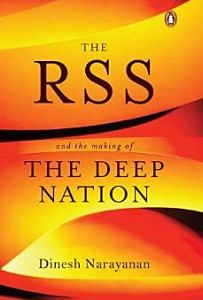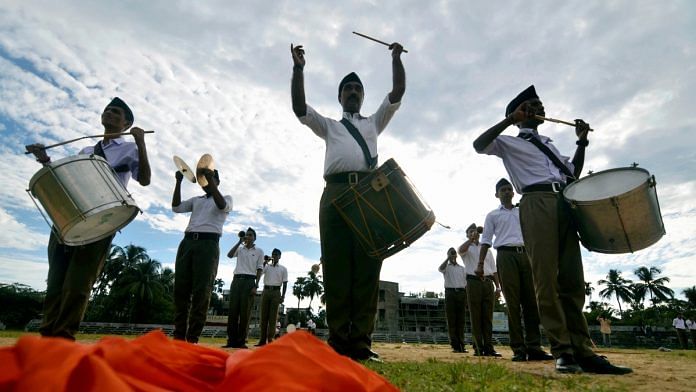Hedgewar strongly believed that it was preparedness and discipline that made the British effective. He envisioned a British army–like organization—highly disciplined, motivated and alert— that would assume the mission of safeguarding and governing the nation but would be spread out and embedded across the country. He estimated that the organization would have achieved its mission if it could train 3 per cent of the urban population and 1 per cent of the rural population. This highly trained cohort would provide leadership to the rest of the community. Topped up with a ‘nationalist feeling’, they could defend the country in any crisis. He had modelled the RSS uniform, training and marching songs with this idea of the British military in mind.
Golwalkar explained the thought behind the targets at a training camp in Jabalpur in 1941. ‘It seems some people have not understood the real meaning of Doctorji’s percentage. “One and three” does not mean we catch hold of any one or three persons out of a hundred, make them wear uniforms and feel satisfied at having fulfilled the target. When Doctorji talked of one per cent in the rural areas, he meant one capable of leading the remaining ninety-nine. The same applied to the urban areas. A world war is going on, so this is the time to fulfil Doctorji’s target as early as possible.’
Over the long term, this volunteer force would be able to influence the country enough to engineer national and community institutions in its ideological framework. This model envisaged replacing the British when the country got independence. At the peak of the Raj a mere handful of British ran the undivided Indian empire. There were only 155,555 British in the country in 1931, according to the census of that year. Of these only 110,137 were men who would have formed the governing cohort, which would have included army officers, policemen, scientists, teachers and missionaries. If it was possible to build an organization whose members could take over the functions these British performed, it would effectively have control of the entire nation. The population of undivided India, including Burma, in 1931 was about 35 crore of which about 4 crore lived in urban centres.
Also read: Modi govt alone can’t fight Covid. It needs foot soldiers like the RSS
A volunteer strength of 1 per cent of the rural and 3 per cent of urban population, as envisaged by Hedgewar, would have added up to about 4 million in 1931. This primary goal of the RSS remains unchanged. It wants a group of volunteers trained in its ideology to be present in every village and neighbourhood. Mohan Bhagwat uses a story to illustrate what Hedgewar wanted to do with the RSS. When the RSS had about fifty volunteers, Hedgewar was asked what he would do next. He replied he would expand it to 500. What next? It would be 5000. He kept increasing the count but never explained what he would do with them. Finally, he said that the Sangh’s objective was just that; create this cohort and leave it to organize Hindu community.
Madhukar Dattatreya ‘Balasaheb’ Deoras, who trained under founder Hedgewar from the age of eleven and went on to lead the organization after Golwalkar, told volunteers at a camp in Kurukshetra in 1965 that Indians had to develop patriotism the way British developed theirs. ‘Thinking of the society and the ever- preparedness to sacrifice everything for the country is also a facet of character. It is said that the Battle of Waterloo was won on the playgrounds of Eaton. It is imperative that we prepare a wholesome environment so that patriotic culture is imbibed through mother’s milk, father’s instruction, games on the playgrounds and pedagogy in schools. Until such a society is not prepared, special organizations like the Sangh and their unique efforts would be required for the safety and security of the country.’
This identification of itself as a special organization responsible for the country’s security is not only self-congratulatory but also an attempt to assume the role of an exclusive arbiter of patriotism.
When it comes to national loyalty, however, even the Maoists— former Prime Minister Manmohan Singh once described them as the biggest internal security threat—have declared that if India is threatened, they would ‘stand by the people and rally against the attack’. But the RSS continues to believe and claim that if it were not for its activities and vigil, India would be in grave danger.
Also read: RSS says Tablighi Jamaat conduct not reflection on all Muslims, they’re aiding govt in fight
The Sangh considers itself an expert at building organizations and managing events. From the beginning, it has relentlessly focused on the organization, smoothening the rough edges and sharpening the spearheads. It has learnt from others and copied successful models. Fashioned after the British army, it not only borrowed the uniform complete with leather belt and puttees, or leg bindings, but also the marching songs. The route march itself was introduced as a show of strength just like military and paramilitary forces do in areas of trouble to warn citizens. Hedgewar even hired Christian teachers and borrowed English tunes to train the RSS band.
In building and nurturing the paramilitary-style organization, Hedgewar and later Golwalkar made every effort to ring-fence it from any kind of conflicts, mainly legal. It is a cardinal rule in the organization that the organization would be protected at all costs. It is perhaps for this legal insulation that Hedgewar laid down the first principle: the Sangh would not, under its own banner, participate in any activity that could draw the attention of law enforcement. It essentially meant even if a swayamsevak were to get into trouble with the law, the RSS would have nothing to do with it. That most instructions in the Sangh are oral helps maintain this deniability. It is the basis of the oft-repeated contention: ‘Sangh kuch nahin karta. Sab kuch samaj karta hai. Or, Sangh kuch nahin karta, lekin swayamsevak sab kuch karta hai (The Sangh does not do anything. Everything is done by the community. Or the Sangh does not do anything, but its volunteers do everything).’
 This excerpt from The RSS And The Making Of The Deep Nation by Dinesh Narayanan has been published with permission Penguin Random House India.
This excerpt from The RSS And The Making Of The Deep Nation by Dinesh Narayanan has been published with permission Penguin Random House India.




Yeah even the Nazis were same and even they fell
So what can an organisation whose skeleton is made of love for facism and nazi views do.juat it’ll fall down.
Who stopped other mental weaklings from organising on such lines. Very concept called Maoist sounds national for armchair psychophants incapable of finding any good points in anything unless money and fame flows out of it. Self less work is a great aversion for such people. Have they ever seen the mammoth work RSS has done without their borrowed lenses of isms?
Always believe in people who defended country in need not people who defended culture and religion.
The RSS thought process of selfless service is what is on display in the country during covid19 crisis. Whereas left leaning ideologues who never criticise China and Congress are trying to deflect attention from their inability to provide any help to society buy spewing venom and misinterpretation and misinformation.